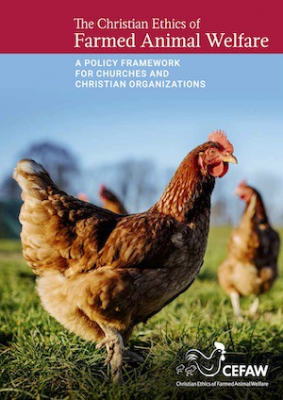Chester University project issues resource on Christian Farmed Animal Welfare

CEFAW
The Christian Ethics of Farmed Animal Welfare (CEFAW) project, based at the University of Chester, have announced the Publication of a free Policy Framework for Christian communities, about why farmed animal welfare should matter to Christians and how Christians can address farmed animal welfare, together.
In a statement CEFAW says: "Christian churches urgently need resources to make sense of farmed animal welfare, especially now, as we move to establish new global trading agreements and tackle urgent concerns about climate change and our environment.
"The COVID-19 pandemic highlights the need for us to think carefully about where our food comes from and to take more responsibility for the robustness of the supply chain. Parliament is currently debating amendments to the Agriculture Bill that would protect UK farmers and UK farmed animal welfare standards from imports produced to lower animal welfare standards. Learning more about how farmed animal welfare connects to Christian faith will help us to shape the world to enable farmed animals, farming communities, and all people to flourish in the future.
"This policy framework gives us the tools to have a voice. It is the product of a research project led by subject specialists in Christian ethics and farm animal welfare and funded by the Arts and Humanities Research Council, with major UK churches as partners (Church of England, Church of Scotland, Church in Wales, Methodist Church, Roman Catholic Church, United Reformed Church).
The Policy Framework shows why Christians - as Christians - should care about farmed animal welfare and how the Church can respond. It provides:
A theological account of farmed animal flourishing and its relationship to human flourishing, drawing on scripture and doctrine.
An ethical account of Christian responsibility for farmed animal flourishing in today's context.
An evaluation of how animals are currently farmed in the UK in relation to a Christian understanding of what is required for them to flourish.
Conclusions and recommended actions for churches and Christian organisations; farmers and farm workers; food retailers, wholesalers, and manufacturers; Christian investors; and policy makers.
The Policy Framework concludes that Christians have strong faith-based reasons for being concerned about the flourishing of fellow animal creatures and have a distinctive responsibility for those farmed for food. Across the world many farmed animals are raised in environments that diminish their ability to flourish. The UK has some of the best farmed animal welfare standards in the world, and yet improvement is both necessary and possible with proper encouragement.
Christians have reason to avoid animal products sourced from systems offering poor opportunities for flourishing. Churches should support farmers who provide the animals in their care with lives worth living and seek to influence wholesalers, retailers, and policymakers to ensure that farmers are paid fairly for providing high levels of farmed animal welfare.
The Policy Framework is useful in various areas of church activity:
Environmental & rural policy
• The framework informs the development of policy and practice in relation to environmental sustainability at national, regional/diocesan, and local church levels. Farmers, farmed animals, and the consumption of animal products have often been ignored in environmental policies, but 'Humans and Other Animals' was a featured theme in the Archbishop of Canterbury's 2020 Lent Book by Ruth Valerio and the #LiveLent campaign.
Worship and church education
• The climate crisis and the COVID-19 pandemic suggest we are hitting hard limits in the human exploitation of the wider creation, triggering feedback effects that threaten human, animal, and environmental well-being. The theology and ethics of the Policy Framework encourage a vision of Christian faith that celebrates our connections with fellow creatures of God. Study guides will provide resources for consideration and discussion in church groups of all ages.
Resourcing church schools
• The Policy Framework enables church schools to connect their Christian mission and values with their practice in a pressing area of public concern. The framework includes recommendations for the catering policy of church schools. Supporting resources will provide ideas for engaging students with the implications of Christian faith for what they eat.
Engaging public policy
• Farmed animal welfare will be high on the public policy agenda in relation to post- Brexit trade negotiations, food security after COVID-19, and UK climate policy. The Policy Framework will enable church representatives to make contributions to these crucial debates informed by a well-grounded theological and ethical analysis.
Informing church investment policy
• UK churches have significant holdings in agricultural land and in shares in businesses involved in farming, food production, food retail, and catering. The Policy Framework draws out the implications for those charged with the management of these assets in accordance with Christian ethical principles.
In 2021 CEFAW will host a series of webinars aimed at exploring different elements of the Policy Framework and providing guidance for how it could be used in different contexts. The webinars will take place on the second Wednesday of each month, from January to April.
Workshops will follow in early 2021, to help participants use the Framework within their church and organizational contexts. CEFAW will also publish an academic book and a book for lay Christians."
The Policy Framework is available here, along with information about the webinars:
www1.chester.ac.uk/cefaw/framework
Email CEFAW at: cefawadmin@chester.ac.uk

















